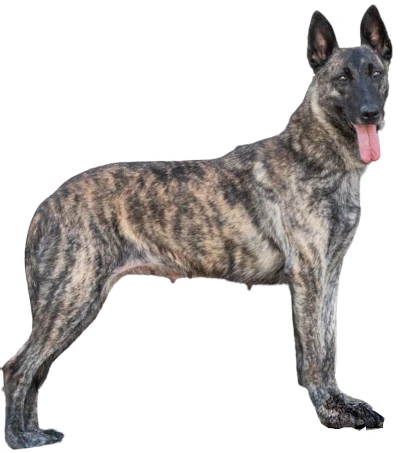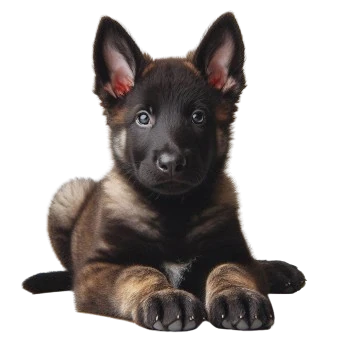
The Dutch Shepherd is a versatile and intelligent dog breed, appreciated for its working skills and devoted nature. Originating from the Netherlands, this breed was initially used to herd sheep and is now recognized for its abilities in various canine work disciplines.
Males typically measure between 57 and 62 cm at the withers, while females measure between 55 and 60 cm. Males weigh between 30 and 40 kg, and females between 25 and 35 kg.
The Dutch Shepherd has a muscular and well-proportioned body with a strong bone structure. Its morphology gives it agility, endurance, and strength. The head is well-proportioned with a slightly rounded skull. The muzzle is of medium length, tapering towards the nose. The eyes are medium-sized, almond-shaped, and dark in color, expressing a lively and intelligent look. The ears are medium-sized, triangular, and erect.
The Dutch Shepherd has three types of coats: short-haired, long-haired, and rough-haired. The short coat is straight, tight, and dense. The long coat is straight, long, and well-fitted. The rough coat is thick and harsh to the touch, with a dense undercoat. The coat colors mainly vary between brindle shades, with golden or silver streaks.
The Dutch Shepherd is known for its balanced, loyal, and intelligent temperament. It is very attached to its family and often very protective. It is an excellent working dog, always ready to perform tasks and learn new skills. Although it may be reserved with strangers, it is generally friendly and sociable with family members and other animals. Early socialization is essential to ensure it gets along well with children and other pets. The Dutch Shepherd is extremely intelligent and easy to train. It excels in canine sports and work activities, such as agility, obedience, tracking, and protection. It needs mental and physical stimulation to avoid boredom and destructive behaviors.
This is a very active breed that requires a lot of daily exercise. It enjoys long walks, runs, interactive games, and work sessions. Activities that engage both its body and mind are ideal.
The Dutch Shepherd thrives in an environment where it has a role or task to perform. It is not well-suited to a sedentary or indoor life without stimulation.
The Dutch Shepherd is generally a robust and healthy breed. However, like all breeds, it can be prone to certain health issues, including hip and elbow dysplasia, as well as some eye diseases.
Regular health check-ups and a balanced diet are essential to keep the Dutch Shepherd healthy. It is also important to choose a responsible breeder who performs health tests on their breeding dogs.
The Dutch Shepherd was developed in the Netherlands in the 19th century to herd sheep and protect farms. It is closely related to the Belgian Shepherd and the German Shepherd but is distinct in character and appearance. In addition to its herding skills, the Dutch Shepherd is used in various law enforcement and protection services due to its intelligence, loyalty, and work aptitude.

The Dutch Shepherd Puppy is an intelligent and versatile dog, particularly suited to active families. It is loyal, protective, and has a strong work instinct, making it an excellent herding dog. This puppy requires early socialization and consistent training to channel its energy. Its coat, which can be short or long, requires regular maintenance to stay in good condition.
The price of a Dutch Shepherd Puppy generally ranges from 800 to 1,800 euros. Puppies from champion lines or reputable breeders may command higher prices, depending on the quality of the pedigree and health tests. Prices may also vary depending on the region and demand.
The Dutch Shepherd is an intelligent, energetic, and very responsive dog to training. To properly train this breed, it is essential to start at a young age. Socialization is a key step: expose it to different environments, people, and animals to make it a balanced and confident dog.
Use positive training methods, such as rewards (treats, toys, or praise) to reinforce good behaviors. The Dutch Shepherd responds very well to motivation and consistency. Avoid punitive methods, as they can harm its confidence and enthusiasm.
Due to its high energy level, it needs regular physical and mental exercise. Incorporate interactive games, obedience sessions, and activities like agility to stimulate its mind and maintain its physical fitness. A well-conducted training will make your Dutch Shepherd a loyal and obedient companion.